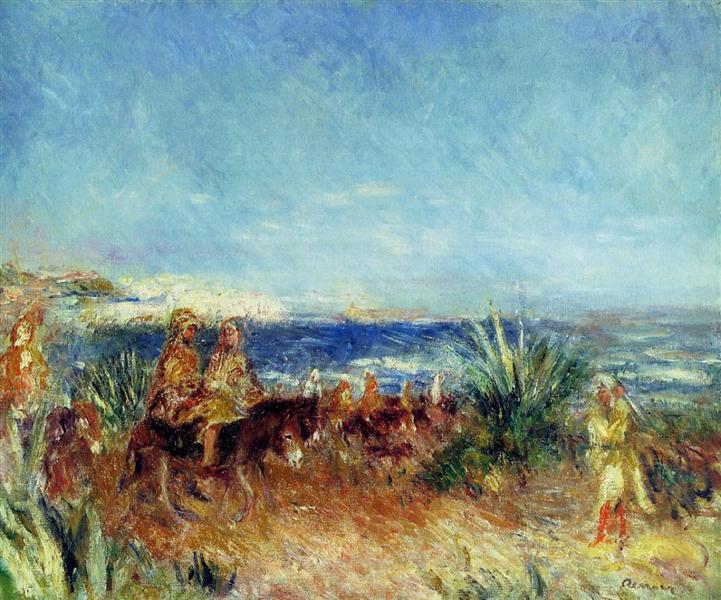Beskrivelse
Pierre-Auguste Renoir's painting "Arabs by the Sea" stands as a jewel of Impressionism, an artistic movement that sought to capture the ephemeral and the sensorial through the vibrant interplay of light and color. This work reflects not only Renoir's technical mastery, but also his ability to convey the atmosphere of the moment and the vivacity of the culture depicted.
Renoir, one of the leading exponents of Impressionism, was characterized by his ability to work with light and color in ways that seemed innovative even in his time. In Arabs by the Sea, Renoir uses a warm color palette, predominantly composed of gold and terracotta tones, which infuse the work with a sense of warmth and energy. The light appears to dance on the surface of the water, captured with the loose, dynamic brushstrokes that are characteristic of the Impressionist style, giving the scene an almost painterly movement.
Compositionally, the work features a group of human figures, possibly of Arab origin, who are positioned at the bottom, to one side, on the seashore. These figures are engaged in conversation, suggesting a moment of social and cultural connection. The artist opts for an arrangement that not only imagines the relationship between people and their environment, but also establishes a visual dialogue with the sea, which is located in the background of the work. The inclusion of these figures not only suggests the presence of Arab culture, but also provides a social context that is fascinating in the analysis of the cultural interactions of his time.
Renoir's treatment of water is particularly noteworthy. Using a loose brushstroke technique, he manages to convey the gentle waves of the sea, mirroring the reflection of the sky on its surface. The blue and green hues that blend in the water act as a counterpoint to the warm earthy tone of the figures, creating a chromatic balance that is visually appealing. This interplay between the water and the human figures adds depth and complexity to the work.
It is interesting to note that during the 19th century, when Renoir created this work, interest in the Orient and Arab cultures had grown significantly in Europe, partly due to colonial expansion and trade. This historical context enriches the interpretation of "Arabs by the Sea", as the artist not only presents an image, but also reflects the fascination that his era had towards other cultures, promoting a dialogue between art and the geopolitics of his time.
Although other works by Renoir have been identified as also addressing themes of life at sea, “Arabs by the Sea” is distinguished by its focus on a specific time and a particular culture, echoing the diversity that Impressionism managed to capture. The work is an invitation to contemplate not only the aesthetics of an everyday scene, but to think about the social and cultural realities that surround us, revealing the timelessness of Renoir’s art in its exploration of humanity.
"Arabs by the Sea", although less known than some of his more prominent works, remains an outstanding representation of the splendor of Impressionism through the use of color, the energy of the figures and the atmosphere full of life that Renoir so masterfully managed to capture.
KUADROS ©, a famous painting on your wall.
Hand-made oil painting reproductions, with the quality of professional artists and the distinctive seal of KUADROS ©.
Painting reproduction service with satisfaction guarantee. If you are not completely satisfied with the replica of your painting, we will refund 100% of your money.

